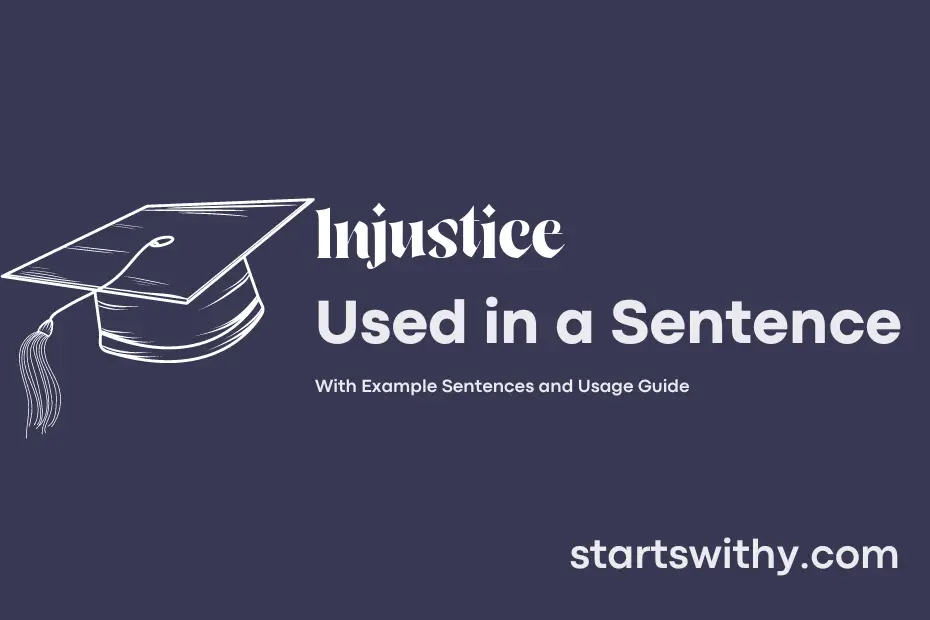Are you familiar with the concept of injustice? In simple terms, injustice refers to unfairness or the violation of rights that leads to harm or discrimination. Injustice can manifest in many forms, including social, economic, or legal inequalities that marginalize certain groups in society.
Instances of injustice often spark outrage and activism as individuals and communities strive for equality and justice. Understanding and addressing these instances of injustice are crucial steps towards creating a more equitable and inclusive society for all.
7 Examples Of Injustice Used In a Sentence For Kids
- Injustice is when someone is treated unfairly.
- We should always stand up against injustice.
- It is important to speak out against injustice.
- We should help those who are facing injustice.
- Everyone deserves to be treated fairly, without any injustice.
- Let’s work together to create a world without injustice.
- Kindness and fairness can help us fight against injustice.
14 Sentences with Injustice Examples
- The injustice of the strict attendance policy penalizes students for missing classes due to legitimate reasons.
- The injustice of the caste system still persists in many parts of India, affecting opportunities for marginalized students.
- The injustice of high textbook prices makes it difficult for students from low-income backgrounds to access necessary course materials.
- The injustice of favoritism in grading can hinder the academic success of hardworking students who do not receive special treatment.
- The injustice of gender discrimination can be seen in the lack of female representation in certain academic departments or leadership positions.
- The injustice of tuition fee hikes places an undue financial burden on students already struggling to make ends meet.
- The injustice of plagiarism accusations can tarnish a student’s reputation and future career prospects, even if unjustified.
- The injustice of limited internship opportunities disproportionately affects students without personal connections or networks.
- The injustice of outdated curriculum can leave students ill-prepared for real-world challenges or current industry demands.
- The injustice of inadequate mental health resources on campus can exacerbate student stress and anxiety levels.
- The injustice of discrimination based on regional identity can marginalize students from minority backgrounds.
- The injustice of limited scholarship opportunities can hinder the educational aspirations of deserving students in need of financial support.
- The injustice of strict dress codes can restrict students’ freedom of expression and individuality on campus.
- The injustice of faculty nepotism can lead to unfair advantages for certain students and undermine the principles of meritocracy.
How To Use Injustice in Sentences?
To use the word “Injustice” in a sentence, start by identifying a situation where there is a lack of fairness or a violation of rights. For example, “There is a great deal of injustice in the criminal justice system.”
When constructing your sentence, ensure that injustice is used correctly and conveys a sense of unfairness or wrongdoing. Avoid using the word in a way that does not accurately capture its meaning, such as “The weather was injustice today,” as this does not make sense in the context of the word.
Consider using injustice to highlight issues of social inequality, discrimination, or unfair treatment. For instance, “Racial injustice continues to be a major problem in our society.”
Remember that injustice is a noun, so it should be used as the subject or object of a sentence. It is important to ensure that the sentence structure is clear and that injustice is used in a grammatically correct manner.
By following these tips, beginners can effectively incorporate the word “Injustice” into their writing to convey themes of unfairness and wrongdoing. Practice using injustice in various sentences to become more comfortable with its usage and nuances in meaning.
Conclusion
Injustice is evident in many forms, from unequal treatment in the justice system to discrimination based on race, gender, or social status. These sentences with injustice highlight the various ways in which individuals may be subjected to unfairness and prejudice. By recognizing and acknowledging these injustices, we can work towards creating a more equitable and just society for all.
It is crucial to speak up against injustice and advocate for change, whether it be through supporting marginalized communities, challenging discriminatory policies, or raising awareness about systemic issues. Through collective efforts and a commitment to equality and fairness, we have the power to address and rectify instances of injustice, fostering a more inclusive and harmonious society for everyone.



